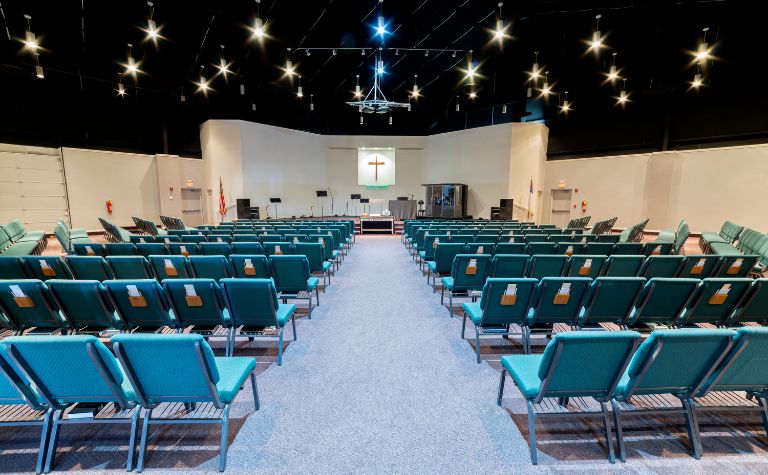The Assemblies of God and the Church of God (Cleveland, Tennessee) are two of the oldest Pentecostal denominations in the world. There is a lot that unites these Protestant-Christian traditions, yet their differences are important as well.
The Assemblies of God and the Church of God are both evangelical, Pentecostal denominations. They both hold that baptism in the Holy Spirit occurs after conversion. The initial evidence for the baptism is speaking in tongues. The Church of God holds to the doctrine of perfectionism. The Assemblies of God doesn’t.
How were these denominations founded, and who founded them? How do their membership numbers compare? Do they agree on doctrines besides speaking in tongues and perfectionism? To learn more, keep reading and see the comparison charts below.
Also, see Pentecostalism and the Charismatic Movement: Differences for more.

Assemblies of God and Church of God (Cleveland, Tennessee) Compared
Several Pentecostal denominations have the name phrase “Church of God” in their name. Some of them add words to their titles to distinguish themselves from others.
The subject of this comparison page is the Church of God (Cleveland, Tennessee). The denomination established itself under this name in Cleveland, Tennessee, in 1907.
Today, the denomination often uses “Cleveland, Tennessee,” to distinguish itself from other denominations, like the Church of God (Anderson, Indiana). (Also see Assemblies of God vs. Methodism: What’s the Difference?)
| OVERVIEW | Assemblies of God | Church of God |
|---|---|---|
| Founded | 1914 in Hot Springs, Arkansas; leaders wanted to unite for a variety of ministry purposes | 1886 in Monroe County, Tennessee; after a few names, the movement was renamed “Church of God” in 1907 when headquarters were moved to Cleveland, Tennessee |
| Founder | Pentecostal pastors and leaders | Richard Spurling (1810-1891) established the Christian Union in 1886 |
| Origin | Unity of theology and effectiveness in missions motivated the founding members. | Spurling was Baptist and sought a cure to the indifference he observed in churches of all denominations. |
| Early influencer(s) | Charles Fox Parham (1873-1929), Agnes Ozman (1870–1937), William Joseph Seymour (1870-1922) | William F. Bryant was influential (1863-1949), as was Ambrose J. Tomlinson |
| Significant writing outside the Bible | The 16 Fundamental Truths | The Church of God Evangel newsletter |
| Size | 69 million members and 375,000 churches worldwide | 7 million members and 36,000 churches worldwide |
| Organization | Assemblies of God churches are organized according to presbyterian polity (though not theology), at the national level as well as the regional or district level. Individual churches, however, are self-governing. | Has a General Assembly composed of elected leaders. Individual churches are self-governing. |
| Divisions | Compared with other large Protestant denominations, the Assemblies of God has been free of significant splits. The internal debate has occurred over a number of issues, but the denomination has avoided large protesting factions. | A leadership crisis in the 1920s eventually led to F.J. Lee establishing the “Church of God of Prophecy” denomination. |
| Theological and Social worldview | The Assemblies of God denomination is evangelical and conservative, theologically and socially. The denomination ordains women to be pastors, which some Christians consider liberal and progressive. | Protestant, evangelical, Pentecostal theology; conservative doctrine and worldview. The denomination ordains women to be pastors. |
Also see Assemblies of God vs. Baptist: What’s the Difference?

Assemblies of God vs, Church of God: Beliefs
The biggest difference between the Assemblies of God and the Church of God is the doctrine of perfectionism. This doctrine teaches that a Christian, through God’s help, can grow in holiness so significantly that they can live without sin in this life.
The Assemblies of God denomination denies perfectionism, while the Church of God embraces it. (Also see Assemblies of God vs. Foursquare Churches: What’s the Difference?)
| BELIEFS | Assemblies of God | Church of God |
|---|---|---|
| Theology (general) | Assemblies of God (AG) is Protestant. It believes that salvation is by grace through faith in Christ alone and not according to works. | Church of God (Cleveland, Tennessee) (CGCT) is Protestant. It believes that salvation is by grace through faith in Christ alone and not according to works. |
| Theology (specific) | AG is Arminian. Within the framework of Arminianism, their belief system is often referred to as “Pentecostal theology.” | CGCT is Arminian, as all Pentecostal denominations are. |
| God | AG believes in the Trinity. There is one God who exists in three persons. | CGCT believes in the Trinity as all Protestant denominations do. |
| Is Jesus God? | Yes | Yes |
| Is the Holy Spirit God? | Yes | Yes |
| The Bible | #1 of The 16 Fundamental Truths state, “The Scriptures, both the Old and New Testaments, are verbally inspired of God and are the revelation of God to man, the infallible, authoritative rule of faith and conduct.” | CGCT affirms the inspiration, inerrancy, and authority of Scripture. |
| View of the atonement | AG believes in the penal-substitutionary atonement of Christ. His death was the punishment for sin, and he took the place of sinners on the cross. | CGCT holds to “the atoning sacrifice of Christ’s death for the sins of the world.” |

| BELIEFS | Assemblies of God | Church of God |
|---|---|---|
| Salvation | #5 of The 16 Fundamental Truths state, “Salvation is received through repentance toward God and faith toward the Lord Jesus Christ. By the washing of regeneration and renewing of the Holy Spirit, being justified by grace through faith, man becomes an heir of God, according to the hope of eternal life.” | CGCT “stands firmly for justification by faith.” |
| Sanctification | AG believes that all Christians can mature in Christ and overcome the world, the flesh, and the devil. It doesn’t believe sanctification occurs in this lifetime but in the next one. | CGCT believes that Christians can mature in holiness and Christ-likeness to the extent that they are perfected in this life. |
| Spiritual gifts | AG believes that all spiritual gifts mentioned in the Bible are operational today, including speaking in tongues, divine healing, and miracles. | CGCT believes “the gifts of power are faith, miracles, and gifts of healing. The gifts of utterance and inspiration are prophecy, tongues, and interpretation. The Holy Spirit bestows these gifts, and those who accept the validity of these gifts are called charismatic.” |
| Water Baptism | Believer’s baptism; only professing believers, not infants, are baptized. Baptism isn’t necessary for salvation. | Like AG, CGCT holds to “Believers Baptism.” Baptism isn’t necessary for salvation. |
| Communion | #6 of The 16 Fundamental Truths state, “The Lord’s Supper, consisting of the elements — bread and the fruit of the vine — is the symbol expressing our sharing the divine nature of our Lord Jesus Christ, a memorial of his suffering and death, and a prophecy of His second coming, and is enjoined on all believers ’till He comes!'” | CGCT regularly practices the Lord’s Supper, understanding the bread and cup as memorials. |
| Eschatology | #14 of The 16 Fundamental Truths state, “The second coming of Christ includes the rapture of the saints, which is our blessed hope, followed by the visible return of Christ with His saints to reign on earth for one thousand years.” | Like AG and other Pentecostal denominations, CGCT is premillennial, holding to a rapture, seven-year tribulation, and a literal 1,000-year reign of Christ on the earth. |
Also see Assemblies of God vs. Pentecostal: What’s the Difference?
Please see the related articles below.
References:
[1] Source
[2] Source
[3] Source
Related Questions
The Assemblies of God and Baptist traditions are sizable and significant branches of Protestant Christianity. They each have a fascinating history in Europe, America, and as of the twenty-first...
The Assemblies of God is one of the largest Christian denominations in the world. Over 100 years after its birth, Assemblies of God churches are still growing. Yet similar to other denominations, not...
